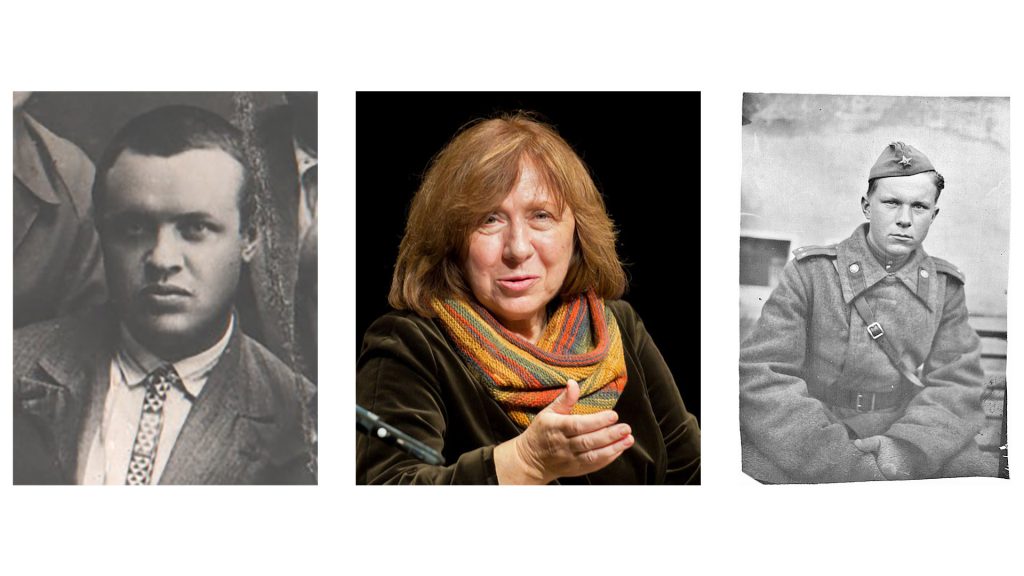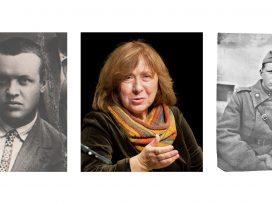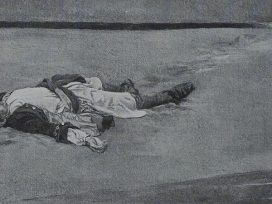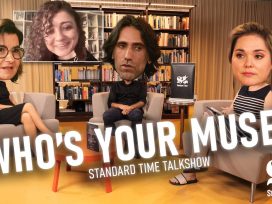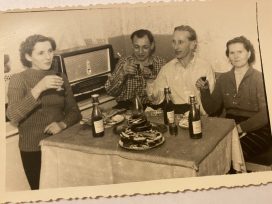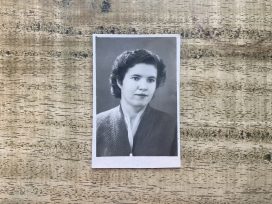Siarhej Šapran: After you received the Nobel Prize for Literature in 2015, you said on several occasions that it was hard to get used to the status the award brings. Do you still feel that way?
Svetlana Alexievich: I can’t say I’m indifferent or detached from the fact that I won the prize, but I do feel a greater sense of responsibility for the words I use. I try to stay true to myself and be honest about my views and convictions. I’ve kept my faith in people, on the whole, though occasionally I lose heart – but that has to be true of everyone.
In his Nobel Lecture, Josef Brodsky spoke about how awkward and confused he felt standing on the rostrum when literary figures like Osip Mandelstam, Marina Tsvetaeva, Robert Frost, Anna Akhmatova and W. H. Auden never had. ‘These shadows disturb me constantly; they are disturbing me today as well,’ Brodsky said. ‘In any case, they do not spur me to eloquence. In my better moments, I deem myself their sum total, though invariably inferior to any one of them individually.’ In your first press conference after you heard you had received the award, you referred to two Russian writers who had been awarded the prize in the past: Ivan Bunin and Boris Pasternak. Did the ‘shadows’ of your predecessors, as Brodsky called them, trouble you as you gave your own Nobel Lecture?
The first writers to spring to mind were the Nobel laureates who had written in Russian – they were all literary giants. And I was sorry that the prize hadn’t been awarded to Alieś Adamovič and Vasiĺ Bykaŭ. They deserved the recognition.
But equally, it’s important that the shadows of the great should give you a sense of freedom, not make you feel despondent. They ought to inspire and motivate you to keep going, try something new and find a different perspective, instead of stumbling around in circles in your usual rut. There are two books I particularly want to write: one is about love, the other about death. I’ve always been interested in the metaphysical and the irrational, anything beyond the limits of our understanding. What do our contemporaries really think about these things? What makes them reflect? What do they fear most? What superstitions do they fall back on in consequence? Whenever I’ve read about the fall of Ancient Rome or the Polish-Lithuanian Commonwealth, I’ve always felt we were short of books that address the way people feel when their world is falling apart. How do they salvage their lives? What do they cling to? Because the most important thing is what happens to each one of us as an individual – hence love and death.
You’ve often said that you write slowly, but your book The Wondrous Deer of the Eternal Hunt must have broken a record! You worked on it for over twenty years – although, admittedly, Goethe took sixty years to write Faust.
Gathering the shards of truth isn’t easy. I’ve been thinking about these two books for a long time. But when you’re writing about an experience as timeless as love, it’s pretty hard to step outside the canon and offer a new reading of the subject. The more so as the people I study are not imagined literary characters but my next-door neighbours. And they have changed enormously over the past twenty years. Today, personal life – which we treated with such derision under communism – carries far more weight than it did then. People no longer hide behind an ideology or an idea. They are seeking to make sense of their own lives and answer questions like: what does it mean to be happy? What do you take with you when you depart this world? What will you recall in the last few minutes of your life? I once got into a conversation about this with a taxi driver who said: ‘You know what I’ll remember before I die? Sipping wine from a woman’s shoe!’ The one thing that’s certain is that we’ll all be conjuring something intensely personal.
You have said that when you were planning your book The Unwomanly Face of War, you collected the first nine stories and didn’t know what to do with them. It took a year’s reading for you to shape your view of what war really is. A different kind of writer might have published the stories right away.
That sort of approach doesn’t appeal to me. Fragmentary work which doesn’t mesh with something bigger can go on for ever. In fact, I was told that I could go on adding to The Unwomanly Face of War until the last female veteran dies. I suppose some new details might have emerged if I’d done that, but not a new perspective on the subject. It’s all time-consuming work which calls for extensive and concentrated thought.
Did you feel that the book had to appear at this particular time – no earlier or later?
No, a book should not be time-specific – though obviously it’s unlikely to last for ever.
Your Swedish translator, Kajsa Öberg Lindsten, has called working with you ‘hard but incredibly fascinating’. She’d be waiting to receive the next part of a book she was translating and instead receive a section she’d already done – reworked. And so it went on, for three years.
When you’re in intense dialogue with someone, you can’t draw a line on the conversation. The process is endless, because they can always retell a story in greater detail. They might think it through after you’ve gone, relax into the narrative, and pull out more ‘material’ the next time you meet. It’s a delicate and complicated procedure.
I recently listened, with considerable interest, to a lecture given by the Russian writer Dmitry Bykov, for whom I have great respect. The lecture had a curious title: ‘Does Svetlana Alexievich’s documentary prose undermine Russian spiritual bonds?’ I had imagined that, in Russia, the controversies over my name might have settled down by now – but I was wrong. Bykov’s conclusion was ambiguous: maybe, maybe not. I may be a writer, or I may be a journalist. What surprised me most was that he failed to grasp what these books are about. He didn’t realize that I’d written a history of life in the communist ‘utopia’. He saw it as journalism. Some people genuinely believe that what I do is very straightforward: listen to somebody talk, jot it down, dot the i’s, cross the t’s – and that’s it.
The Swedish-Belarusian translator Dmitry Plax, who based a play on your book Second-Hand Time, said that: ‘When I began working on the text, I saw she had reworded everything from start to finish. Her language is wholly invented, it’s pure synthesis. If you try and break it up into dramatic dialogue, you realise people never talk like that. But you only notice it when you look closely at the wording. It’s brilliantly done. You could award her the Nobel Prize for that alone.’
Obviously, in everyday life people don’t use language in that way. Normally, they’d be talking in platitudes. But the people I’ve interviewed recently have been either on the verge of death or else in love. In these heightened states, people often express themselves in extraordinary ways. They seem to grow. It’s as if they were standing on tiptoe, pulling out these magnificent threads from somewhere deep in their hearts. But afterwards, the fibres have to be woven into cloth from all the words they have spoken.
Have you experienced ‘artistic inspiration’ yourself?
Of course. Just try and write something without clearly formulating the idea that moved you in the first place. If you need to decode it later, you won’t be able to access the meaning: the electric charge will have gone. That’s what inspiration is.
Your mentor, Alieś Adamovič, talked about the concept of ‘super-literature’. In one of his articles, he refers to Fyodor Dostoyevsky mock execution in St Petersburg’s Semyonovsky Square in 1849. He was led out in front of a firing squad and given a reprieve only at the very last minute. According to Adamovič, variations of this experience – the feeling that life was about to be snapped off – reappeared again and again in Dostoyevsky’s novels. Adamovič calls it ‘the painful self-scrutiny of a man condemned to die’. Dostoevsky, Adamovič goes on, would keep to one extraordinary story for the length of a book. Your books, however, contain numerous accounts of this kind. Do they constitute the ‘super-literature’ that Adamovič is discussing?
I’d be more inclined to call them novels assembled from human voices. A composer will pick up sounds from the surrounding chaos in the same sort of way. I don’t consider what I do ‘super-literature’. It’s just an unusual form of writing that tries to convey experiences that cannot be recounted in a conventional narrative form. That’s why you have to begin at the heart of things – with a human being whose words will be trusted. And so, you start with a direct witness. We no longer believe some ideas or the people who promote them because, all too often, we’ve been disappointed and deceived. But we do trust a witness and, in particular, numerous witnesses. One person may tell a string of lies, but if there are many people acting as witnesses, you can build up a credible image of the times and events they describe.
One must be alert, though, because people can be creative when telling their stories. Everyone will present their own version. The writer has to be very attentive and have immense insight. You need to be sensitive to any hint of fabrication. I was born in a city, but spent my adolescent years in the countryside, so I have a clear-headed view of life. The village raised me and I have a knack for identifying what’s inauthentic or false. I remember all those stories I heard. I know how people talk whose lives have been ruined. They were living individuals but, as a generation, they were lost.
What will remain of our own times? Today’s younger generation is unlikely to leave any literary legacy at all – no memories, not even a style of writing. It’s the age of the Internet.
An era in which thoughts shimmer and vanish away. Everything is transient and ephemeral. People used to live and function with a very different perception of time and space. Even I’m having difficulty trying to recover the vestiges of my former work rhythm. It’s increasingly problematic. I’m also pretty tired of the writer I used to be. I would prefer to think about other things, do something else, but I can’t seem to get away. I’m constantly being dragged back into my former life!
It must be the price to be paid for the Nobel.
Either for the prize, or the life it brings with it. You really do need a quiet, solitary life to think things through, but instead you’re caught in a maelstrom!
At the Nobel awards ceremony, in Stockholm, you broke all the rules. You didn’t wear an evening gown and, in your lecture, you didn’t offer the usual thanks to the committee. Instead, you spoke about the ‘Red Empire’ and your special hero, the little man – that victim of the failed Marxist experiment to create a bright future for all.
The Swedish response to the speech was extremely positive. Sincerity has a way of amazing people. And as regards the outfit, when I was told the dress had to be décolleté I replied: ‘What kind of message will I be sending, if I stand there talking about Chernobyl in a low-cut dress with a golden necklace?’ What would be the point of that? If I’d turned up at the Nobel Prize Award Ceremony in that sort of get up, it wouldn’t have been me!
There were all kinds of speculation about what you were going to say while you were in Stockholm. You’ve often said that you act as the ‘human ear’ but, in Autumn 2015, did you allow yourself to pay attention to the controversies provoked by any mention of your name?
No, though obviously I heard them. I spent far more time wondering about how to find a way of speaking Belarusian in that grand hall – it was hugely important for me. And then I remembered a tiny old woman who used to give me a lift out of the village in her cart. It was a real joy to feel that her words touched people’s hearts and left so many moved.
Her words were a parable that transformed a standard text into a piece of literature.
I like to help my readers hear the sound of poetry in everyday life and language. It’s what I do.
Do you look at what’s been written about you?
Since the Nobel Prize, the attacks have fallen away. Before that, I’d get four or five hundred reviews calling me every name under the sun! I read this stuff because I’m curious about ‘mass consciousness’. I like to get a sense of the overall mood. After the prize was awarded, a number of Russian writers pounced on me – so I read about twenty articles with quite some interest. Later, I went on to read what they’d written about Bunin when he was awarded the Nobel Prize, and I thought: well, at least they haven’t classified me as ‘a mad dog’ – or not yet! And look what they wrote about Brodsky! If you want to keep your integrity and stay yourself, the price is inordinately high. You have to learn to take things easy.
Vasiĺ Bykaŭ was called a ‘collaborator’ and a ‘Judas’ in Belarus.
He was called all kinds of things! In my student days, I chose Hrodna for my on-the-job journalistic training just to get sight of him. As young people, we were very interested in Bykaŭ’s books. But, sadly, he took everything that was said about him to heart. I, on the other hand, have been researching the topic of mass consciousness and collective thinking all my professional life. I treat it as an intellectual concept and am able to detach myself from the negativity, which Bykaŭ could never do. Why should I get upset about things? If Solzhenitsyn’s contemporaries had been allowed to critique and edit the Gulag Archipelago – what would have been left of the original? You have to do your job quietly, the way you feel it should be done.
In Belarus, your most popular title is Second-Hand Time. It’s still a bestseller. Which of your books does the rest of the world read?
Second-Hand Time attracts the most interest, but Chernobyl Prayer is popular as well. A few years ago, over three hundred thousand copies were printed in France alone. But the most surprising thing is that The Unwomanly Face of War has recently done well in America, the UK and elswhere A number of factors may have contributed to its success – after all, it did a lot to reveal the way women perceived war and the value of our lives, as well as the capacity people have for self-denial. We will be the last generation to have met and known people capable of this degree of personal sacrifice. Today, people are far more reluctant to give up their lives.
Some time ago there were attempts in Belarus to promote the slogan: ‘ask not what your country can do for you, ask what you can do for your country’. The initiative faded pretty quickly.
People think differently now. They value their lives. I was surprised that so many Russians were prepared to get involved in the slaughter in Ukraine. It may be that they’d lost jobs, and that they’d been left with no principles or conception of morality, no sense of any difference between good and evil. People talk about religion in Russia, but there doesn’t seem to be any connection between their professed beliefs and what they do. On one occasion, I witnessed them seeing off some so-called ‘patriotic volunteers’ with a wind orchestra and an Orthodox priest present. I find it hard to imagine this sort of thing happening in Belarus.
The Belarusian technology entrepreneur Viktar Prakapenya told me about his experiences when he was detained by the Belarusian authorities in 2015. One of his cellmates was having a bad time adapting to prison conditions. ‘What are you snivelling about?’, a warden said to him: ‘There was a time when you could have been shot. In 1937, my granddad was executing hundreds of guys like you in a single day!’ He wasn’t ashamed that his grandfather was a mass murderer, he took pride in it.
Well it’s not surprising, given that the authorities keep telling security officers that their connection with the KGB is nothing to be ashamed of. Take the incident when the Minister of the Interior, Ihar Shunievich, donned the NKVD uniform to attend a World War II commemorative parade! Can you imagine a politician in Germany dressing up in the SS uniform?
What are your views on lustration?
I believe it should have taken place, but that now the time has passed. We missed our chance. It’s a complicated issue because Belarusian society was steeped in the communist idea. My father, who was head of a school, joined the Party during the Battle of Stalingrad. He would have been subject to lustration, of course. But would it have been fair? The same is true of his friends. They too were intelligent and decent people, who sincerely believed in communism. My father thought the idea behind it was excellent, but that Stalin had trashed it. I remember arguing with him after my return from Afghanistan. ‘Don’t believe everything they tell you, Dad,’ I said. ‘We’re killing people out there.’ And for the first time ever, my father said nothing in response. He wept. It was a huge shock. But he kept his party card until the day he died. When I saw him there, crying, I gave up on the arguments. I felt sorry for him. I realized that the most important thing was maintaining a loving relationship with my father. Whenever I get together with my ‘heroines’ – the women I’ve interviewed – we talk about our grandchildren, cooking, recipes, whatever. But we never touch on politics. I’ll always remember something one of my interviewees said: ‘Life and the love we have for each other should take priority over everything.’
In the village where I grew up, there was a neighbour we called Uncle Pecia. He was very elderly. Whenever I came back to the village, I used to argue with him about Alexander Lukashenka. If things got too heated, Uncle Pecia would wind up the conversation, by saying: ‘We’re not going to tear each other apart just because of them, are we? They’re way over there and we’re here.’ Perhaps if lustration had taken place…
…history would not have repeated itself. But only if it had been done back then, on the crest of a wave. It would have been a massive shock for our society, of course. It’s astonishing, really, how quietly fifteen million communists walked away from power, with no bloodshed. Though, as it turns out, not altogether. Things are coming full circle. What we’re seeing can’t be called ‘communism’ – but it has been happening for some time now and, in my view, it’s comparable.
In the 1990s, many writers made public statements about how the KGB had tried to recruit them. Attempts were made to enlist people from Vasiĺ Bykaŭ’s inner circle while he was living in Hrodna. Did they try to recruit you?
There was one incident. I was planning to go to Belgium – it was a trip connected to my research – and I had a telephone call from a man who said he wanted to meet me. My sister was very ill, in the late stages of cancer, and I replied that I had no time at all. But he insisted that it was very important. He even told me where he worked. And we met, in a park. ‘We’ll recommend you for a trip to Belgium despite your complicated biography,’ he said. ‘Despite the fact that you won the first all-Union award and were due to take a Lenin-themed tour, the dean of the Faculty of Journalism at the Belarusian State University, Grigory Bulatsky, has raised objections. But we have one request. When you get back you must tell us what happened there.’ I refused – so we went our separate ways. ‘We’ll meet again,’ he said. This happened in the 1980s, before perestroika. Because things were already building up to change, they didn’t see it through. There was no point, not once perestroika had started. In the end, I never went to Belgium because I had to take care of my sister. I can’t even remember if they asked me to sign anything.
Here is an excerpt from Adamovič’s notebooks: ‘During those stormy meetings of the Writers’ Union in 1956–1957, one rather hot-tempered member of the organisation demanded that, at the very least, the most obviously discernible informers and infiltrators should be expelled from the Union. In the event, they didn’t even get rid of the most insignificant figures. The “heavyweights” protected them. Was this so as not to open the floodgates?’ Elsewhere, Adamovič is more conciliatory. ‘We should have reflected more, but at the time we felt only anger,’ he writes. ‘We should have wondered why the real victims, those who had been through exile, were so much more tolerant and sympathetic towards the colleagues who had betrayed them than we were. Those who had been in the hands of the NKVD had learned things about other people and about themselves. They knew what human beings are capable of, and what the limits are. We understood nothing of all this, as we sat waiting for times to change’.
In my youth I supported lustration, but now that I’ve had so much experience, I can see how hard it must have been for people to make their choice. In Second-Hand Time there’s a shocking story going back to the 1930s. It concerns a man who had been very close to a neighbour he called Aunt Olya. When, decades later, perestroika was introduced and the KGB archives were opened, his mother said: ‘I can tell you now that “Aunt Olya”, of whom you were so very fond, was a woman who betrayed her own brother. He died in the Kolyma camps.’ Her son was completely stunned. Some years later, he got a letter from his mother telling him that Aunt Olya was dying, and he made the journey home to put his question. ‘Why did you do it, Aunt Olya?’ he asked. ‘There wasn’t a single decent person to be found in those days,’ came the reply. ‘What do you remember about 1937, in general?’ he persisted. Aunt Olya smiled. ‘I was happy! I was loved. And I was in love,’ she said. There is no such thing as pure, unadulterated evil. There’s Stalin, there’s Beria, and there are the Aunt Olyas of this world.
When you finished your first book, Adamovič observed: ‘It’s taken thirty years for you to come into your own. It wouldn’t have worked out any earlier’.
I also remember that, when I brought him a late draft, he said: ‘It’s a good thing I didn’t do this myself! There are so many things here I’d never have thought to ask. As a man, I never suspected they existed. I’m genuinely glad it was you.’ These words meant a lot to me at the time, and they still do. Initially, he had wanted to write the book himself. It was his idea: he was thinking about several books. But now, much like Adamovič who was unaware of the way women experienced war, I’m finding it hard to cope with stories told by the men I interviewed on the subject of love. It’s a totally different mindset. I often feel I’ve no idea what I should be asking! It’s a huge problem and I haven’t yet found a way of resolving it. There’s something missing. I simply cannot grasp where love features in masculine consciousness.
Vasiĺ Bykaŭ liked to use the phrase: ‘Do what you must, come what may.’ It’s a saying often attributed to Leo Tolstoy – though it may not have originated with him. Can I ask about your ‘personal creed’?
I have a different favourite saying, also attributed to Tolstoy: ‘If you’re crossing a fast-flowing river, steer the boat upstream, beyond your destination, or you’ll be carried off course.’ I kept it as my motto for years. But these days I prefer another. It’s something Ivan Bunin said: ‘No matter how much sadness there may be in this unfathomable world, it remains wonderful.’ Or there’s that brief line by the poet Olga Sedakova: ‘Living hurts.’ The words have a different tonality, but they’re very close to my heart.
When the opera singer Larysa Aleksandroŭskaja was asked what was the most frightening thing that happened to her during the war, she smiled and said that it had happened after the war was over. She described how she’d had to deliver a speech in the Kremlin, at a meeting attended by Stalin. He must have been in a playful mood, because during her speech he asked: ‘Why is this representative of the Belarusian people giving her presentation in Russian? She should be speaking Belarusian. We’ll understand’. So, frantically, she began a translation. After she had finished, she returned to her seat. Then came the tap on her shoulder. She was taken to a separate room and told to wait. She waited five, ten, twenty minutes. No one came. All this time there was just one thought going through her head: ‘I’m about to be taken away to prison’. After an hour they let her go. Only then did she find out that while she had been contemplating her imminent arrest, the transcript of her speech was being translated back into Russian.
Stalinism devoured Aleksandroŭskaja’s generation. I can imagine what hell she went through anticipating her own arrest. There’s no comparison with any issues one might experience today – though there’s no knowing what the future will bring. The most terrible things I ever witnessed had a far more personal quality. For example, the fact that I was abroad when my mother died. Or my father contracting Alzheimer’s. You arrive and the person you once knew is already gone. These are intense experiences of a far more subjective and intimate kind.
When I was completing my book of conversations and interviews with you – it struck me that you don’t seem to be as tough on the authorities as you were twenty years ago.
Twenty years ago, we thought it was all going to be over within days.
And it turned out that everything was still ahead of us. Now people are tired of waiting. As you’ve put it yourself: ‘The past is still to come’.
We’re certainly showing signs of fatigue, but people have changed as well. Their aspirations are different. They’re more concerned about their own, private lives. When I’m asked why I didn’t allow myself to become some kind of symbol of political resistance, or why the Writer’s Union isn’t making calls for the status quo to be overturned, I always say: let’s look at the cultural and mental components of the issue. It seems to me that opposition should take a different form. I’m not suggesting compromise because that always raises the question of where the limits lie. A lot depends on what individuals do, especially when they have any degree of power. One reader may buy my books and another won’t – but either way it’s not for Lukashenka to supervise that sort of thing. I’m not a fan but, to be fair, it’s not just about him.
Irina Antonova, Director of the Pushkin Museum in Moscow, was asked once what single question she would put if she found herself face to face with God. This was her reply: ‘I’d ask “Why?” He’ll know what I mean’. What question would you put to God, if the chance ever arose?
I’d ask: why are our lives so short? We can do so little in the limited time we’ve been given. Surely we could have a few more years. At least we wouldn’t have to arrive at Heaven’s Gate empty handed.

